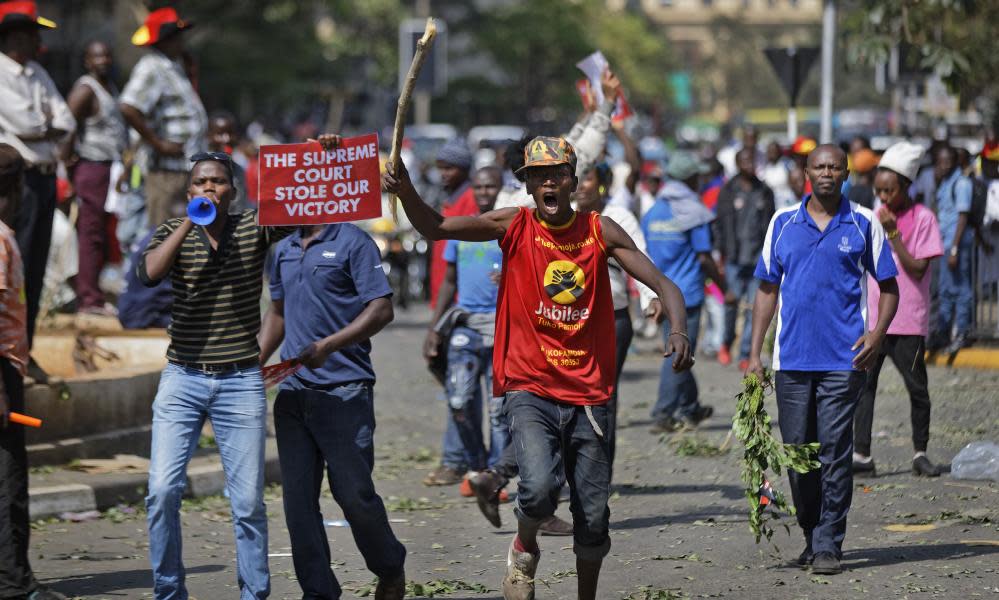Kenyan election annulled after result called before votes counted, says court

Kenya’s supreme court has said it annulled presidential elections held in August because the polls were “neither transparent nor verifiable” and blamed the country’s electoral commission for the shortcomings.
Uhuru Kenyatta, the incumbent president of the east African state, won a second term by a margin of 9%, defeating his long-term rival, Raila Odinga, in the election last month. The country now faces new elections in October, and possible lengthy political instability.
The court’s majority decision to annul the poll – the result of which was announced three weeks ago – surprised many observers and embarrassed local, African and western observers who said they had found no major problems with the election.
On Wednesday, the court offered a detailed explanation of why it annulled the 8 August election – the first decision of its kind in Africa.
Reading out portions of the judgment, Philomena Mwilu, the deputy chief justice, said the court had upheld the opposition claim that the election result was declared before all results from Kenya’s more than 40,000 polling stations had been received.
The poll had therefore not been “conducted in accordance with the constitution”, leaving “no choice but to nullify it”.
The court’s decision has sharpened the political divide in Kenya, one of Africa’s biggest economies, and risks a constitutional crisis. Odinga, who lost by 1.4m votes, has said he will not take part in the new elections scheduled for 17 October unless some staff at the electoral commission are fired, among other demands.
Electoral officials may struggle to meet the deadline as the French company responsible for the technological systems used for elections has said it cannot be ready in time. The constitution specifies that a rerun must occur before November.
The court also raised deep concerns about the failure of the Independent Electoral and Boundaries Commission to open its computer servers to the court, and irregularities in the transmission of results, though the judges made clear they had not seen evidence that there was any systematic or deliberate rigging.
In the aftermath of the annulled poll, opposition officials repeatedly described the election results as a fraud and claimed that Odinga, who leads the National Super Alliance (NASA), was the “legitimate” winner.
Dozens died in scattered protests in opposition strongholds but the widespread violence predicted by some did not occur.
Odinga’s claims of rigging after defeat in 2007 elections prompted rioting and retaliation by security forces, which tipped the country into its worst crisis for decades. About 1,200 people were killed in the campaign of ethnic violence that followed.
The election was Odinga’s fourth failed shot at the presidency. In 2013 he said the election was rigged and took his case to the supreme court, but lost.
Kenyatta has accepted the court’s decision and aides say he is confident of winning again.
The political atmosphere is acrimonious, however. On Tuesday evening, the deputy president, William Ruto, accused the court of favouring the opposition while ruling party officials said Odinga would face impeachment proceedings if he was victorious in the rerun.
David Maraga, the chief justice, said threats against judicial staff had risen since the supreme court ruling. He cited the demonstrations outside the court and threatening messages sent on social media to individual judges and their staff.
“Senior political leaders have also threatened the judiciary, promising to cut it down to size and teach us a lesson,” Maraga said, adding that judges would not be intimidated by anyone and were ready to pay the “ultimate price” to protect the constitution and rule of law.
George Kinoti, the national police spokesman, said they were waiting for details of the chief justice’s criticism before responding.
Reported instances of hate speech have risen sharply since the surprise court ruling on 1 September. The heads of western diplomatic missions in Kenya, including those of the EU, US and Britain, urged Kenyan leaders to avoid comments that could incite hatred and violence.
“Now is the time to focus on preparing for the new poll, which, in line with the court’s order and the constitution, must be run by the Independent Electoral and Boundaries Commission and be held by the end of October,” they said in a joint statement.

 Yahoo News
Yahoo News 